Читать книгу Culture and Materialism - Raymond Williams - Страница 19
На сайте Литреса книга снята с продажи.
The Base and the Productive Forces
ОглавлениеSo we have to say that when we talk of ‘the base’, we are talking of a process and not a state. And we cannot ascribe to that process certain fixed properties for subsequent translation to the variable processes of the superstructure. Most people who have wanted to make the ordinary proposition more reasonable have concentrated on refining the notion of superstructure. But I would say that each term of the proposition has to be revalued in a particular direction. We have to revalue ‘determination’ towards the setting of limits and the exertion of pressure, and away from a predicted, prefigured and controlled content. We have to revalue ‘superstructure’ towards a related range of cultural practices, and away from a reflected, reproduced or specifically dependent content. And, crucially, we have to revalue ‘the base’ away from the notion of a fixed economic or technological abstraction, and towards the specific activities of men in real social and economic relationships, containing fundamental contradictions and variations and therefore always in a state of dynamic process.
It is worth observing one further implication behind the customary definitions. ‘The base’ has come to include, especially in certain twentieth-century developments, a strong and limiting sense of basic industry. The emphasis on heavy industry, even, has played a certain cultural role. And this raises a more general problem, for we find ourselves forced to look again at the ordinary notion of ‘productive forces’. Clearly what we are examining in the base is primary productive forces. Yet some very crucial distinctions have to be made here. It is true that in his analysis of capitalist production Marx considered ‘productive work’ in a very particular and specialized sense corresponding to that mode of production. There is a difficult passage in the Grundrisse in which he argues that while the man who makes a piano is a productive worker, there is a real question whether the man who distributes the piano is also a productive worker; but he probably is, since he contributes to the realization of surplus value. Yet when it comes to the man who plays the piano, whether to himself or to others, there is no question: he is not a productive worker at all. So piano-maker is base, but pianist superstructure. As a way of considering cultural activity, and incidentally the economics of modern cultural activity, this is very clearly a dead-end. But for any theoretical clarification it is crucial to recognize that Marx was there engaged in an analysis of a particular kind of production, that is capitalist commodity production. Within his analysis of this mode, he had to give to the notion of ‘productive labour’ and ‘productive forces’ a specialized sense of primary work on materials in a form which produced commodities. But this has narrowed remarkably, and in a cultural context very damagingly, from his more central notion of productive forces, in which, to give just brief reminders, the most important thing a worker ever produces is himself, himself in the fact of that kind of labour, or the broader historical emphasis of men producing themselves, themselves and their history. Now when we talk of the base, and of primary productive forces, it matters very much whether we are referring, as in one degenerate form of this proposition became habitual, to primary production within the terms of capitalist economic relationships, or to the primary production of society itself, and of men themselves, the material production and reproduction of real life. If we have the broad sense of productive forces, we look at the whole question of the base differently, and we are then less tempted to dismiss as superstructural, and in that sense as merely secondary, certain vital productive social forces, which are in the broad sense, from the beginning, basic.
